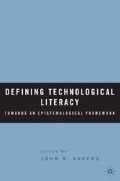Abstract
The philosophy of technology is a fairly young discipline, compared to, for example, the philosophy of science. Most of what was published in the early days of this discipline was fairly critical. Authors such as Martin Heidegger and Jacques Ellul wrote in rather negative terms about the impact of technology on humans and on culture. These authors are commonly reckoned to be the Continental philosophers, the term “Continental” referring to the European Continent (with countries such as Germany and France). It is also common use to contrast this Continental stream in philosophy with the analytical stream. This, of course, is a strange way of defining contrasting philosophical streams, as “Continental” is related to the geographical origin of authors, while analytical has to do with the nature of what the philosophers in that stream do. The reference to geographical differences is becoming more and more problematic, as nowadays many analytical philosophers are from the Continent. Therefore a better way of distinguishing the two streams is not by referring to the background of the philosophers but to the kind of philosophical work they do. Then it seems appropriate to distinguish between two functions or tasks of philosophy: an analytical function, and a critical function (De Vries, 2005a). The analytical function deals with conceptualization (Scruton, 1996).
Access this chapter
Tax calculation will be finalised at checkout
Purchases are for personal use only
Preview
Unable to display preview. Download preview PDF.
References
Audi, R. (1998). Epistemology. A Contemporary Introduction to the Theory of Knowledge. London and New York: Routledge.
Baird, D. (2004). Thing Knowledge. Chicago: Chicago University Press.
Boden, M. (1997). “What is interdisciplinarity?”. In R. Cunningham (ed.), Interdisciplinarity and the Organisation of Knowledge in Europe. Euroscientia conference. Luxembourg: Office for the Official Publications of the European Communities: 13–26.
Dipert, R. (1993). Artifacts, Art Works and Agency. Philadelphia: Temple University Press.
Dooyeweerd, H. (1969). A New Critique of Theoretical Thought, Vols I—IV (transl. from Dutch by D. Freeman and W Young). Si.:. The Presbyterian and Reformed Publishing Company.
Houkes, W., Vermaas, P. Dorst, H., and Vries, M.J. de (2002). Design and use as plans: an action-theoretical account. Design Studies, 23 (303–320).
Kroes, P. and Meijers, A. (2000). “Introduction: a discipline in search of its identity.” In P. Kroes, and A. Meijers (eds.), The Empirical Turn in the Philosophy of Technology. Oxford: Elsevier Science, xvii—xxxv.
Laudan, R. (1984). “Introduction.” In R. Laudan (ed.), The Nature of Technological Knowledge. Are Models of Scientific Change Relevant? Dordrecht: D. Reidel Publishing Company, 1–26.
Meijers, A. (2000). “The relational ontology of technical artifacts.” In P. Kroes and A. Meijers (eds.), The Empirical Turn in the Philosophy of Technology. Oxford: Elsevier Science, 81–96.
McCormick, R. (1997). “Conceptual and procedural Knowledge.” In M.J. de Vries and A. Tamir (eds), Shaping Concepts of Technology. From Philosophical Perspectives to Mental Images. Dordrecht: Kluwer Academic Publishers, 141–159.
Mitcham, C. (1994). Thinking Through Technology. The Path between Engineering and Philosophy. Chicago: University of Chicago Press.
Mitcham, C. (2002). “Do Artifacts Have Dual Natures? Two Points of Commentary on the Delft Project,” Techné, 6: 2 (9–12).
Pitt, J. (2001). “What Engineers Know.” Techné, 5: 3 (17–30).
Ropohl, G. (1997). “Knowledge Types in Technology.” In M. de Vries, and A. Tamir (eds.), Shaping Concepts of Technology: From Philosophical Perspectives to Mental Images. Dordrecht: Kluwer Academic Publishers, 65–72.
Ryle, G. (1949). The Concept of Mind. Chicago: The University of Chicago Press.
Sarlemijn, A. (1993). “Designs are cultural alloys. STeMPJE in design methodology.” In M. de Vries, N. Cross, and D. Grant (eds), Design Methodology and Relationships with Science. Dordrecht: Kluwer Academic Publishers, 191–248.
Scruton, R. (1996). Modern Philosophy. An Introduction and Survey. London: Pengu in Books.
Vincenti, W. (1990). What Engineers Know and How They Know It. Baltimore: Johns Hopkins Press.
Vries, M.J. de (2003). “The nature of technological knowledge: extending empirically informed studies into what engineers know,” Techné, 6: 3 (1–21).
Vries, M.J. de (2005a). Teaching About Technology. An Introduction to the Philosophy of Technology for Non philosophers. Dordrecht: Springer. Kluwer Academic Publishers.
Vries, M.J. de (2005b). 80 Years of Research at Philips. The History of the Philips Natuurkundig Laboratorium, 1914–1994. Amsterdam: Amsterdam University Press.
Editor information
Copyright information
© 2006 John R. Dakers
About this chapter
Cite this chapter
de Vries, M.J. (2006). Technological Knowledge and Artifacts: An Analytical View. In: Dakers, J.R. (eds) Defining Technological Literacy. Palgrave Macmillan, New York. https://doi.org/10.1057/9781403983053_3
Download citation
DOI: https://doi.org/10.1057/9781403983053_3
Publisher Name: Palgrave Macmillan, New York
Print ISBN: 978-1-349-53206-3
Online ISBN: 978-1-4039-8305-3
eBook Packages: Palgrave Social & Cultural Studies CollectionSocial Sciences (R0)

